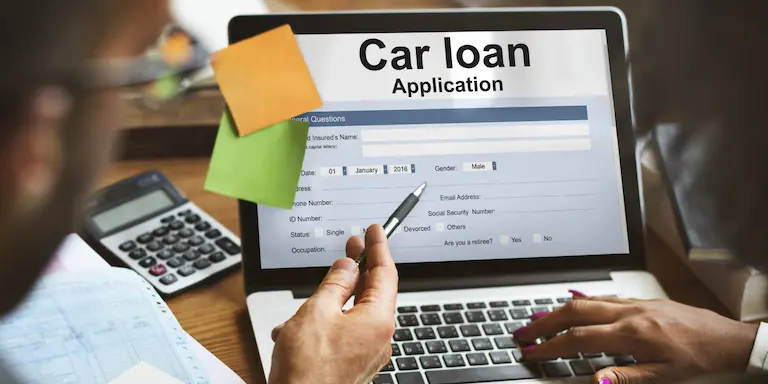Introduction
When it comes to securing a vehicle loan, your credit score plays a pivotal role in determining the terms and interest rates you receive. If you have bad credit, you might worry about the possibility of being offered unfavorable rates or even being denied a loan altogether. However, the truth is that obtaining the best vehicle loan rates with bad credit is still possible – but it requires a bit of strategy, research, and understanding of the loan market.
Key Takeaways
- Bad credit may result in higher interest rates, but it’s still possible to secure favorable loan terms by shopping around and considering alternative strategies like a co-signer or larger down payment.
- Working on improving your credit score before applying for a vehicle loan can lead to better loan offers.
- Online lenders, credit unions, and dealerships offering special financing can provide options for individuals with bad credit.
Understanding Bad Credit and Its Impact on Vehicle Loans

What is Bad Credit?
Bad credit typically refers to a credit score below 600, though this threshold can vary slightly depending on the scoring model used. A low credit score may indicate a history of missed payments, high debt-to-income ratio, or other financial challenges.
How Bad Credit Affects Vehicle Loan Rates
Lenders view individuals with bad credit as higher-risk borrowers because their financial history suggests a greater likelihood of missed payments or defaults. As a result, they may charge higher interest rates to compensate for the risk. In addition to higher interest rates, those with bad credit may face limited loan options, smaller loan amounts, and shorter repayment terms.
Despite these challenges, it is still possible to get a loan with favorable terms if you know where to look and how to improve your situation.
How to Get the Best Vehicle Loan Rates with Bad Credit
While getting the “best” vehicle loan rates with bad credit is more challenging, it’s not impossible. Here are some key strategies to help you secure the best possible loan:
1. Shop Around and Compare Lenders
One of the most important things you can do is shop around. Different lenders have different criteria, and some are more lenient when it comes to offering loans to individuals with bad credit. By comparing multiple lenders – including banks, credit unions, and online lenders – you can identify the best rates available for your credit situation.
Online platforms like LendingTree, Bankrate, and Autotrader allow you to compare loan rates from multiple lenders, helping you find the most favorable terms.
2. Consider a Co-Signer
A co-signer with a good credit score can significantly improve your chances of getting better loan rates. If you have a family member or friend willing to co-sign the loan, their credit score will be considered alongside yours, potentially lowering the interest rate. However, keep in mind that the co-signer is also responsible for the loan if you miss any payments, so it’s important to be sure you can handle the repayments before asking someone to co-sign.
3. Make a Larger Down Payment
A larger down payment shows lenders that you are financially responsible and lowers the loan amount. This can reduce the risk for the lender and may result in a lower interest rate. A down payment of 20% or more is often recommended, as it demonstrates your commitment to the purchase.
4. Opt for a Shorter Loan Term
Although shorter loan terms mean higher monthly payments, they often come with lower interest rates. If you can afford a higher monthly payment, opting for a shorter loan term (such as 36 months) could help you save money on interest over the life of the loan. Lenders may view borrowers with shorter loan terms as less risky, making them more likely to offer favorable rates.
5. Look for Special Financing Offers
Many car manufacturers and dealerships offer special financing deals for individuals with bad credit, especially for those purchasing new vehicles. These deals often feature lower interest rates, rebates, or deferred payment options. Be sure to check for any available promotions or offers from your preferred car brands or dealerships.
6. Consider a Secured Loan
Secured loans are backed by collateral, usually the vehicle you’re purchasing. Because the lender has the car as collateral, they may offer a better interest rate compared to unsecured loans. However, if you fail to make payments, the lender can repossess the car to recover their loss.
7. Improve Your Credit Score Before Applying
Although it may take time, improving your credit score before applying for a vehicle loan can help you secure better rates. Start by paying down outstanding debts, making all your payments on time, and checking your credit report for any errors. Even a modest improvement in your credit score can make a big difference when it comes to loan approval and rates.
Certainly! Here’s a further expansion of the article on “Can You Get the Best Vehicle Loan Rates with Bad Credit?” that includes more details and depth. I’ll continue building on what we’ve discussed so far:
The Importance of Credit in Vehicle Loan Approval

Before we dive deeper into the practical ways of securing a vehicle loan with bad credit, it’s essential to understand why credit plays such a crucial role in loan approvals and rates.
Why Do Lenders Care About Your Credit Score?
Credit scores are a measure of your financial history and reliability. When lenders evaluate your application for a vehicle loan, they use your credit score to gauge how likely you are to repay the debt. Lenders assume that individuals with higher credit scores have a more reliable history of repaying debt, and as such, they offer lower interest rates to incentivize lending to these borrowers.
On the other hand, bad credit is often seen as a red flag. It indicates that you might have missed payments, accumulated high debt, or even experienced bankruptcy. Since lending money to someone with a history of financial trouble is riskier, lenders charge higher interest rates to mitigate their risk. Higher rates mean more money for the lender, but also more financial strain for you as the borrower.
Credit Score Range and Its Implications on Loan Rates
Here’s a breakdown of how credit scores typically impact loan rates for vehicle loans:
- Excellent (750 and above): This group enjoys the lowest rates, often ranging from 3% to 5%. You’re considered a low-risk borrower.
- Good (700-749): Borrowers with scores in this range may see interest rates around 5% to 7%, though they still benefit from favorable loan terms.
- Fair (650-699): Individuals in this range are often offered rates between 7% and 12%. These rates can vary significantly based on the lender.
- Poor (600-649): With bad credit, you’ll likely face interest rates anywhere from 12% to 20% or higher.
- Very Poor (Below 600): Individuals with very bad credit may be faced with rates above 20%. Lenders may also require additional safeguards, such as co-signers or collateral.
Practical Steps to Improve Your Chances of Getting the Best Vehicle Loan Rates
While securing the lowest rates with bad credit is difficult, several strategies can improve your situation. Here’s a more detailed guide to the steps you can take:
1. Shop Around, Don’t Settle for the First Offer
When you have bad credit, you might feel pressured to accept the first loan offer that comes your way. However, doing this can often lead to you paying more than necessary. Take the time to compare offers from multiple lenders, such as:
- Banks and Credit Unions: While banks may have more stringent approval requirements, credit unions are often more flexible when it comes to working with individuals with bad credit. They might offer lower rates or better terms, so don’t overlook them.
- Online Lenders: Online lenders such as LendingClub, Carvana, and RoadLoans can provide instant quotes, allowing you to compare rates from the comfort of your home.
- Dealership Financing: Many car dealerships offer financing options directly through their partnerships with lenders. However, be cautious here, as dealerships often add a markup to the rates they receive, leading to higher payments.
2. Use Online Tools and Loan Calculators
Many websites allow you to enter your details and receive an estimated loan rate based on your credit score. Platforms like Bankrate, Autotrader, and Credit Karma provide personalized loan calculators and allow you to compare terms without affecting your credit score. Taking advantage of these tools can help you identify which lenders are likely to offer the best rates based on your current financial situation.
3. Consider a Larger Loan Term
While most borrowers want to pay off their loans quickly to save on interest, extending the loan term can sometimes help make monthly payments more affordable. However, this will result in paying more in interest over the life of the loan, so consider your long-term financial stability before choosing a longer term.
For example, if you extend your loan to 72 months instead of 36 months, your monthly payment will be lower, but the interest you pay overall could increase. Weighing the benefits of manageable monthly payments versus the cost of interest is crucial when selecting the loan term.
Negotiating Better Loan Terms
Don’t be afraid to negotiate. Many borrowers accept the first offer they get, but if you’re proactive, you can often secure better terms. Here are some negotiation tactics to consider:
- Explain Your Situation: If your bad credit is due to an isolated incident (e.g., a medical emergency or job loss), it’s worth explaining this to the lender. Some lenders may be willing to make exceptions or offer more favorable terms if they understand the context.
- Provide Documentation of Your Income: Having a steady income reassures lenders that you can repay the loan. Showing proof of income, such as pay stubs or tax returns, can strengthen your case.
- Ask for Rate Reductions: While not guaranteed, some lenders may be willing to lower their rates slightly to secure your business. It never hurts to ask.
Consider Refinancing Your Loan Later
If you’re initially offered a high-interest loan due to your bad credit, don’t despair. Once you’ve made regular, on-time payments for a few months, your credit score may improve. At this point, consider refinancing your vehicle loan for a better rate.
Read mor : Vehicle Loan Interest Calculator: How Much Will Your Monthly Payments Be?
Conclusion
Getting the best vehicle loan rates with bad credit may seem like a daunting task, but with the right strategies, it’s entirely possible to secure a loan that fits your financial needs. By shopping around, considering a co-signer, making a larger down payment, and taking advantage of special offers, you can reduce your interest rates and improve the overall affordability of your loan.
FAQs
Can I get a car loan with bad credit?
Yes, it’s possible to get a car loan with bad credit, though you may face higher interest rates and limited loan options. Shop around and consider a co-signer to improve your chances.
How much more will I pay for a car loan with bad credit?
You can expect to pay significantly more for a loan with bad credit due to higher interest rates. The exact difference depends on your credit score and the lender, but it can be anywhere from a few percentage points to double the rate for those with excellent credit.
What’s the best way to improve my credit score before applying for a loan?
Pay down existing debts, make payments on time, and check your credit report for errors. If you have outstanding collections, try negotiating with creditors to remove negative marks.
Should I consider a loan from a dealership with bad credit?
Dealership financing can be a good option for those with bad credit, but make sure to compare rates. Sometimes, dealerships offer high rates or hidden fees that may not be apparent upfront.
Can a co-signer help me get a lower interest rate?
Yes, a co-signer with a good credit score can help you secure a better interest rate. However, the co-signer is also responsible for the loan if you miss any payments.
What’s the minimum credit score for a good car loan?
While the minimum credit score varies by lender, most require a score of at least 650 for favorable terms. A score below 600 is often considered bad credit.
Are there any online lenders that offer vehicle loans for bad credit?
Yes, several online lenders specialize in providing loans for individuals with bad credit, including LightStream, RoadLoans, and Capital One Auto Loans.





